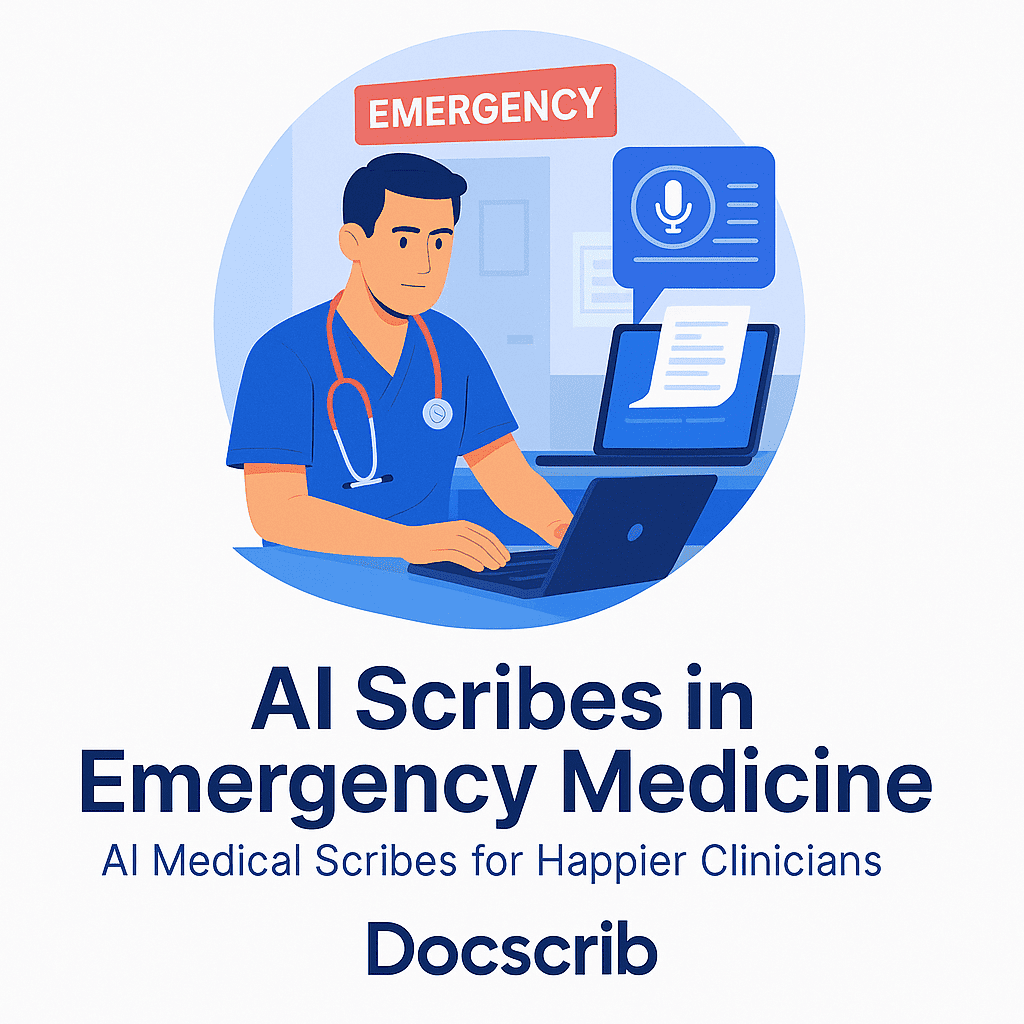Updated on: July 2, 2025
Emergency medicine is high-stakes, high-speed, and high-volume. Physicians must triage, diagnose, stabilize, and manage dozens of patients per shift — all while juggling a crushing documentation load.
Every moment you spend typing chart notes is one less spent focusing on your patient.
That’s where AI scribes in emergency medicine come in.
DocScrib is an AI-powered, real-time scribe that listens to clinician-patient encounters and instantly generates accurate, structured notes — tailored to the fast-paced demands of emergency departments.
⏱️ More patients seen. Less charting. Happier clinicians. That’s the power of Docscrib in the ED.
The Documentation Crisis in Emergency Medicine
Emergency physicians spend nearly 44% of their time on documentation — often charting late into the night, leading to burnout, errors, and inefficiencies.
Key pain points include:
-
Documenting complex encounters under time pressure
-
Interrupted charting due to emergent cases
-
Copy-paste fatigue and template overload
-
EHR friction in fast patient turnover environments
-
Delayed billing and reduced clinical accuracy
This isn’t just a nuisance — it’s a patient safety issue and a workforce risk.
What Is an AI Medical Scribe?
An AI medical scribe uses voice recognition and natural language processing (NLP) to listen to clinician-patient conversations and convert them into clean, complete documentation.
With DocScrib, the AI listens ambiently — no wake words or prompts needed. It understands clinical language, adapts to your style, and produces structured SOAP notes, HPI, ROS, physical exams, procedures, assessments, and plans in real time.
All notes are HIPAA-compliant, editable, and can be exported directly into your EHR system.
How Docscrib Elevates Emergency Medicine
1. Real-Time Charting Without Slowing Down
Whether you’re evaluating chest pain, performing a laceration repair, or delivering bad news to a family, Docscrib is listening — discreetly capturing every word and drafting the note as you go.
No more:
-
Typing between patients
-
Voice memos that need later transcription
-
Clicking through 20 EHR fields during a trauma code
🩺 Example:
“40-year-old male with sudden-onset severe headache, BP 180/110, photophobia. CT head ordered. Neuro consult pending.”
DocScrib auto-generates:
-
HPI: Sudden, severe headache with elevated BP
-
Assessment: Concern for subarachnoid hemorrhage
-
Plan: Emergent CT head, neurology consult
2. High-Volume Efficiency Without Accuracy Trade-Offs
ER providers often see 30–40 patients per shift. DocScrib is designed to match that speed, reducing charting time by over 65% per encounter — while maintaining clinical accuracy.
It supports:
-
Rapid triage documentation
-
Repeat re-evaluations
-
Critical care note templates
-
Trauma workflows
-
Procedural documentation (e.g., intubation, chest tubes, central lines)
💬 “DocScrib finishes the note before I move on to the next room. It’s like having a silent co-pilot for every patient.”
3. Less Burnout, More Bandwidth
Clinician burnout is rampant in emergency medicine. Long hours, shift stress, and EHR overload are top contributors.
By handling the bulk of documentation, DocScrib gives you back your mental energy and your time.
-
No more late-night catch-up charting
-
Improved work-life balance
-
Reduced error rates from documentation fatigue
-
Enhanced clinician satisfaction and retention
✅ AI medical scribes aren’t just a tech upgrade — they’re a workforce wellness tool.
Docscrib vs Other AI Scribes
| Feature | DocScrib | Soaper | Freed | ChartNote | NoteMD |
|---|---|---|---|---|---|
| Real-time ambient documentation | ✅ Yes | ✅ Partial | ✅ Yes | ❌ Manual | ❌ No |
| Emergency medicine workflows | ✅ Custom | ❌ Generic | ❌ Limited | ❌ No | ❌ No |
| Critical care & trauma support | ✅ Built-in | ❌ No | ❌ No | ❌ No | ❌ No |
| HIPAA & SOC 2 compliance | ✅ Certified | ✅ Yes | ✅ Yes | ✅ Yes | ✅ Yes |
| Works with major EHRs | ✅ Seamless | ❌ No | ✅ Some | ✅ Some | ✅ |
| Burnout reduction focus | ✅ Proven | ❌ | ✅ | ❌ | ❌ |
🚑 Curious how Docscrib works under real ED pressure?
👉 Book your live emergency demo now →
Real-World Results: Docscrib in the Emergency Department
Hospital: Riverway General ER, Level I Trauma Center
Team: 14 Emergency Physicians, 8 PAs
Challenge: Charting lag, increasing burnout, billing inconsistencies
After Docscrib:
-
84% reduction in after-shift documentation
-
+4 additional patient slots per shift
-
98% note accuracy rate
-
Fewer missed billing opportunities
-
Physicians report improved communication and focus
🧠 “We used to stay 90 minutes post-shift just for charts. Now we leave on time. And our notes are cleaner than ever.” — Emergency Physician, Riverway General
FAQs
Is Docscrib HIPAA-compliant?
Yes — fully. All recordings are encrypted, never stored long-term, and all data is processed with HIPAA and SOC 2 compliance standards.
Can it handle trauma, codes, and fast-paced multi-patient documentation?
Absolutely. Docscrib is trained to follow the real language of emergency medicine. From GCS scores to ACLS algorithms, it adapts to your documentation needs.
Does it work with scribes or mid-levels?
Yes. You can assign Docscrib across providers and teams — from residents to NPs to attending physicians. Multi-user support and customizable templates are included.
Final Thoughts: AI That Understands the Pace of the ER
Emergency medicine is relentless. Your documentation tool shouldn’t slow you down — it should keep pace.
With AI scribes in emergency medicine, Docscrib empowers clinicians to work smarter, respond faster, and focus on saving lives, not managing charts.
If you’re ready to reclaim your time, reduce burnout, and streamline patient care documentation in the ER — Docscrib is ready to help.
👉 Try Docscrib. Built for emergency medicine. Trusted by clinicians.
